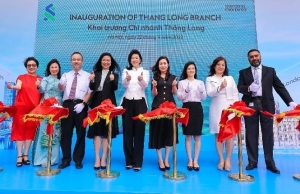INTERNATIONAL INVESTMENT
AND PORTAL
 Nguyen Ngoc Lan Anh, chief technology and operations officer at Standard Chartered Bank Vietnam
Nguyen Ngoc Lan Anh, chief technology and operations officer at Standard Chartered Bank Vietnam
AI is a transformative force reshaping industries, economies, and societies across the globe. From accelerating automation and boosting operational efficiency to unlocking innovation, AI is redefining how organisations make decisions, enhance customer experiences, and generate value.
In today’s rapidly evolving financial services sector, AI – particularly Generative AI – is poised to drive significant transformation and disruption, offering competitive advantages and promising groundbreaking advancements that will greatly expand the industry's innovation landscape.
At its core, GenAI uses existing data to create new data content or patterns, holding immense potential to revolutionise the banking sector in game-changing ways. By harnessing advanced algorithms and vast datasets, AI empowers financial institutions to streamline operations, elevate decision-making, and deliver hyper-personalised services tailored to the expectations of digital-native clients.
According to the 2025 Gartner CIO Agenda Report, "The biggest expected changes in technology investments are GenAI (39 per cent), cybersecurity/information security (34 per cent), and AI (33 per cent)."
Additionally, PWC's 2025 annual CEO Survey revealed that 82 per cent of CEOs in the Asia-Pacific region have adopted GenAI in the last five years, with 34 per cent expressing high trust in integrating AI into core business processes.
The potential of AI in the financial services sector spans a broad spectrum of domains, including operational efficiency, risk management, cybersecurity, financial crime prevention, fraud detection, regulatory compliance, human resources, customer experience, and product innovation.
Taking cybersecurity as an example, since cyber threats evolve in complexity and scale, AI-driven defence systems have become essential. These technologies strengthen security by processing large datasets, identifying weaknesses, and automating defence measures.
AI systems use machine learning to analyse vast volumes of data, providing real-time insights that help detect network anomalies, spot phishing attempts, and uncover zero-day vulnerabilities.
AI also enhances behavioural analytics, detecting unusual patterns and signalling insider threats or compromised accounts. By leveraging historical data and threat intelligence, predictive models can anticipate emerging threats, enabling organisations to proactively counter cyberattacks.
Similarly, in financial crime prevention, AI is increasingly being adopted for its ability to analyse extensive datasets, detect transaction anomalies, and recognise patterns in customer behaviour, thus improving risk management and compliance.
As digital transformation accelerates, financial crimes such as cybercrime, fraud, money laundering, and terrorist financing are becoming more sophisticated. AI enhances transaction monitoring, detects irregularities, and supports sanctions compliance.
Moreover, it helps proactively identify emerging crime patterns, reducing the workload on human resource staff and lowering compliance costs.
As AI capabilities continue to advance, they promise to not just optimise existing processes, but also significantly enhance the customer experience and provide highly personalised financial services.
For example, AI-powered chatbots and virtual assistants deliver 24/7 support, leveraging natural language processing and machine learning to efficiently address customer queries.
Furthermore, AI-driven analytics can assess customer historical transactions, offering personalised and tailored product recommendations that align with each individual's needs.
At Standard Chartered, the potential for GenAI help us innovate and create long-term value for our clients, colleagues, and communities.
Standard Chartered launched SC GPT, a GenAI tool that exemplifies the bank’s commitment to innovation and responsible AI adoption, across 41 markets worldwide in March
Built on a foundation of robust governance and ethical AI principles, SC GPT is designed to enhance operational efficiency, client engagement, and employee productivity for over 70,000 staff.
A more customised version is currently in development, enabling our bank to leverage proprietary group data to address institution-specific challenges more effectively. Additionally, local teams are encouraged to explore and implement market-specific use cases, further enhancing the impact of SC GPT.
By embracing AI-driven innovations, banks are unlocking new possibilities and setting a stage for a future where technology and human ingenuity converge to create unprecedented value.
As AI adoption accelerates, the real challenge lies not only in leveraging the technology, but also in ensuring AI is implemented responsibly, inclusively, and sustainably.
AI models rely on strong data lineage to support accurate training, testing, and deployment. Maintaining clear traceability of data origins, transformations, and applications ensures model performance, enhances reliability, and supports regulatory compliance.
The success of AI initiatives depends heavily on the quality, relevance, and robust governance of the underlying data.
To ensure responsible AI deployment, organisations must invest in strong data management frameworks that emphasise accuracy, security, transparency, and compliance.
This is essential not only to maintain trust, but also to prevent issues such as data bias or manipulation that could compromise outcomes and decision-making.
Integrating GenAI into the banking sector requires rigorous oversight, given the industry’s zero-tolerance stance on errors and the high potential for financial, regulatory, and reputational risks.
Financial institutions must balance innovation with strong risk management by conducting regular audits to verify the accuracy, fairness, and reliability of AI systems.
Standard Chartered demonstrates this commitment through its Responsible Artificial Intelligence Framework, which ensures every AI application upholds the principles of ethics, transparency, and accountability.
We have adopted an outcome-focused approach, viewing data and AI as tools to better serve our people and clients in pursuit of business goals.
Effectively integrating AI into banking requires combining technological capabilities with human expertise, emphasising AI as a tool for augmentation rather than replacement.
Continuous learning is essential for the workforce to stay current with evolving AI trends and to collaborate effectively with AI systems. Human oversight ensures contextual understanding, adaptability, and responsible training and monitoring of AI outputs.
One of the fundamental pillars of Standard Chartered’s people strategy is upskilling and reskilling, aimed at equipping employees with the necessary skills to thrive in a technologically advanced environment.
Upskilling and reskilling employees to collaborate effectively with AI is crucial. To support this, we have launched future workforce transformation journey in Standard Chartered’s learning platform, focusing on both technical and human capabilities.
To keep our employees at the forefront of innovation, we have introduced the Axess Academy – a bespoke and curated technology training centre.
This initiative represents our commitment to nurturing a culture of continuous learning and innovation among our workforce.
AI is one of the main learning focus points for the bank. We have also introduced the AI Learning Hub and organise frequent workshops with top industry leaders and experts.
Additionally, our AI-enabled Talent Marketplace connects employees with projects that align with their skills and interests, fostering growth, engagement, and cross-functional collaboration.
These platforms are essential in bridging skill gaps and building a workforce that is ready for the future.
In conclusion, the integration of AI into the financial services sector marks a pivotal moment in shaping the future of banking.
By leveraging the power of AI and focusing on responsible, ethical implementation, financial institutions can unlock new opportunities for growth, efficiency, and customer satisfaction.
Standard Chartered’s commitment to innovation, data governance, and continuous learning ensures that AI will drive technological advancement and empower its people to thrive in a rapidly evolving landscape.
As the industry continues to adapt, it is clear that AI will play a central role in reshaping the future of financial services, fostering a more secure, efficient, and customer-centric ecosystem.
 Standard Chartered Bank Vietnam supports COVID-19 prevention and relief efforts
Standard Chartered Bank Vietnam supports COVID-19 prevention and relief efforts
Keeping with its brand promise to be "Here for Good", Standard Chartered Bank Vietnam has made a series of monetary donations worth $200,000 and other in-kind donations to support the COVID-19 prevention and relief efforts in Vietnam.
 Standard Chartered Vietnam commits MoUs worth $8.5 billion for green projects
Standard Chartered Vietnam commits MoUs worth $8.5 billion for green projects
Standard Chartered Bank Vietnam has recently committed MoUs worth up to $8.5 billion in sustainable financing for three Vietnamese businesses namely T&T Group, Geleximco Group and Van Lang Investment and Education Management Corporation, to support their sustainability goals.
 Standard Chartered Bank gears efforts to broaden sustainability footprint
Standard Chartered Bank gears efforts to broaden sustainability footprint
Sustainability and green development has become vital across the board, including in the finance and banking sector. Harmander Mahal, head of Consumer, Private, and Business Banking for Vietnam and Asia Cluster Markets at Standard Chartered Bank highlights the bank’s activities to grow stronger and best serve customers and partners through the crafting of a sustainable product suite.
 Standard Chartered Vietnam appoints first Vietnamese CEO
Standard Chartered Vietnam appoints first Vietnamese CEO
Standard Chartered Bank Vietnam announced the appointment of Nguyen Thuy Hanh, CEO and head of Banking and Coverage, effective October 1.



















